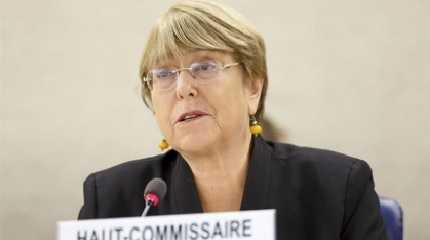
UNITED NATIONS Jul 02 (APP): UN High Commissioner for Human rights, Michelle Bachelet, has voiced serious concern that since the Taliban took power, women and girls in Afghanistan were experiencing the most significant and rapid roll-back in enjoyment of their rights across the board in decades.
Speaking at the UN Human Rights Council’s session in Geneva on the rights of Afghan women, she condemned the massive unemployment of women, the restrictions placed on the way they dress, and their access on basic services.
Women-owned and operated businesses have been shut down, Ms. Bachelet added, saying that 1.2 million girls no longer have access to secondary education, in line with a decision by the de facto authorities who took power in August 2021.
“The de facto authorities I met with during my visit in March this year, said they would honour their human rights obligations as far as [being] in line with Sharia law,” she said.
“Yet despite these assurances, we are witnessing the progressive exclusion of women and girls from the public sphere and their institutionalized, systematic oppression”.
Ms. Bachelet encouraged the re-establishment of an independent mechanism to receive complaints from the public and protect victims of gender-based violence.
“Beyond being right, it is also a matter of practical necessity”, said the High Commissioner.
“Amid the economic crisis, women’s contribution to economic activity is indispensable, which itself requires access to education, and freedom of movement and from violence”.
Also speaking at the Human Rights Council, its Special Rapporteur for Human Rights in Afghanistan, Richard Bennett, described a chilling attempt by the Taliban to make women “invisible, by excluding them almost entirely from society”.
As an example of the de facto authorities’ intentions to impose “absolute gender discrimination”, the rights expert also noted that women are now represented by men at Kabul’s Loya Jirga, or grand assembly of religious scholars and elders.
Such measures contravene Afghanistan’s obligations under numerous human rights treaties to which it is a State party, Bennett insisted before adding that the situation for women “massively diminish(ed) women’s lives, deliberately attack women and girls’ autonomy, freedom and dignity, and create a culture of impunity for domestic violence, child marriage and sale and trafficking of girls, to name but a few of the consequences”.
A draft resolution on the situation of women and girls in Afghanistan is being negotiated at the Human Rights Council and will be considered on 7 July.




